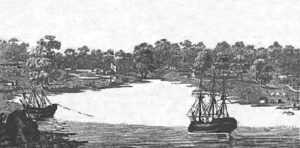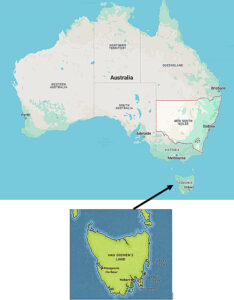
Little did I think as I watched the television drama Banished, that I would one day write about one of my relatives who experienced the same sentence as those featured in that series. The compelling serial, a fact-based, fictional account of life in an Australian penal colony, was based in Botany Bay whereas Charles Mansell served his sentence in the dreaded Van Diemen’s Land.
Up until the 1770s, the British had used parts of North America as a penal colony. Many thousands of convicts were transported and set to work in the plantations there. The American War of Independence brought that to an abrupt end and Britain had to find another location and with a policy of sending them as far away as possible, Australia was the land of choice. Britain’s undesirables were sent there to survive in a hot, hostile environment. The authorities established two major convict colonies – New South Wales (1788-1840) and Van Diemen’s Land (later Tasmania, 1803-1853) – later joined by others including Swan River in Western Australia (1850-1868).
On the 13th of May 1787, 11 ships set sail from the Isle of Wight and headed for Sydney (Botany Bay) with almost 1,000 convicts – the first consignment sent to Australia. The flotilla, nine transport ships and two warships, arrived in Botany Bay in January 1788.
 An impression of Sydney Cove near Botany Bay in 1788
An impression of Sydney Cove near Botany Bay in 1788
Authority in these colonies lay with the governors but the military had great powers and severely punished attempted escapes or transgressions.
Van Diemen’s Land (renamed Tasmania in 1856) became the primary penal colony in Australia with some of the country’s largest and most notorious penal settlements. Dutch explorer, Abel Tasman, claimed to have discovered it in 1642 and named it after Anthony van Diemen, the governor-general of the Dutch East Indies. Between 1804 and 1853, more than 70,000 convicts were forcibly transported to work for the state and private landowners there. The island had a reputation for being inescapable and the convicts suffered from its harsh environment and isolation.
A sentence of transportation could be imposed for a raft of reasons including pickpocketing, shoplifting, stealing horses and sheep, highway robbery, housebreaking, receiving stolen goods and where a sentence of execution was commuted. During the 1800s these were three of many Truronians transported: James Coombs –14 years for stealing a shirt, John Flinn – seven years for stealing a silk handkerchief and James Lampshire – ten years for stealing a black mare. The first two cases appear trivial by today’s standards but the simple statement probably conceals the fact that they were probably recidivists or repeated offenders.
Charles Mansell
Fast forward to the early 19th century and we have Charles Mansell, the thirteenth child of James and Ann Wherry Mansell of Truro. His name does not appear in the list of their offspring on some Mansell family trees and I have gained the impression that it was removed following his indiscretions. Since discovering him, I have added it to mine!
Charles is not my direct relative and I will not bore you with how many greats need to be added to identify him as my uncle. As you will read, in his case, the word great is decidedly inappropriate anyway.
Charles was born in 1813, in Truro. I have no information about his young life but I imagine he played in the opes and streets of Truro and any schooling would have been rudimentary although he is recorded as being able to read and write.
It seems that his first brush with the law was when he was aged 17 but, intriguingly, the crime is not listed in his criminal record. It is possible that it was a conviction for trespass when he was fined twenty shillings, a considerable sum at that time and probably equivalent to about £150 now (2024). The mention of him being in prison could have been a pre-trial committal on this charge.
Name: Charles Mansell
Age: 17
Marital Status: Single
Occupation: Labourer
Birth Year: about 1814
Abode or Birth Place: Kenwyn, Truro
Discharged Date: 1831
Prison: Bodmin Gaol
By 1833 his status had changed from labourer to carter – perhaps in conjunction with his brother – Henry. This may have been his first, or his first major, crime although by modern day standards it would have probably received a punishment of probation. Back in 1833, however, it warranted a three month-prison sentence and Charles was back in Bodmin gaol again: this time to serve out his sentence.
Name: Charles Mansell
Date of Trial: Epiphany 1833
Trial Year: 1833
Location of Trial: Cornwall, England
Sentence: Imprisonment.
Age: 19
Marital Status: Single
Occupation: Carter
Birth Year: about 1814
Abode or Birth Place: Kenwyn
Discharged Date: 1833
Prison: Bodmin Gaol
Notes: “Stealing a paper parcel containing a Naval Uniform Coat and Waistcoat and other articles property of Jn. Tozer.”
Ironically, and possibly of some significance, his father died earlier that year.
We assume that Charles served his sentence and returned to his life as a carter (and brewer) and the next report is on the 7th April 1835 when he appeared at the Truro Quarter Sessions on the charge of stealing 200 lbs of hay, the property of Joseph Carne of Kenwyn, Truro.
On the 28th February 1835 the Royal Cornwall Gazette reported:
Charles Mansell, accused of stealing hay from a rick belonging to Mr Joseph Carne, has been committed to the county prison for trial at the next Sessions. Henry Mansell, charged with being concerned in the offence, has been admitted to bail. The accused are brothers, and have been carriers between Truro and Redruth.
Henry was found to be not guilty and the Criminal Register records: “Henry Mansell, aged 24, born about 1811, tried 7 April 1835 for Larceny, Not Guilty, Acquitted, can read and write”.
Charles was not so fortunate. His character report of “Notoriously dishonest, idle, bad, Convicted before” probably went against him and he received a guilty verdict. A stiff sentence must have been expected – perhaps a year or so in prison but I wonder if he had prepared himself for what was handed down. To be Transported to Van Diemen’s Land for seven years.
The report of his trial appeared in the Royal Cornwall Gazette of the 11th April 1835:
Cornwall Easter Sessions – The Sessions for this County commenced at Truro on Tuesday last before E.W.W. Pendarves, Esq, Chairman, and other Magistrates. Charles Mansell (2nd conviction for felony) found guilty of stealing hay from a rick the property of Mr Joseph Carne of Truro – Sentenced to be transported for seven years.
On the 16th September 1835, Charles was one of 240 male convicts who departed Portsmouth on the convict ship, Bardaster, and headed for Hobart. He appears to have been a petty criminal with a rebellious nature who had been transported alongside murderers and other notorious criminals.
The guard comprised two commissioned officers and 30 soldiers of the 28th regiment. The complement included nine women and nine children – mostly infants under sixteen months. Alexander McDonald was the ship’s master and Joseph Steret, the surgeon who was kept busy with cases of smallpox, other diseases and sickness and a case of apoplexy which proved fatal.
Conditions aboard the convict ships varied, but a common theme was overcrowding. The hulks were often crammed with individuals chained together, the pungent scent of unwashed bodies, illness, and despair permeating the atmosphere. (Wikipeadia)
It is difficult to appreciate the wretchedness of those on board these convict ships but the condition of the sick must have been truly dreadful, so much so that Steret wrote, “… it is impossible to convey by writing, any notion of the loathsome mass of suppuration and putrescence which the patients became”.
The Bardaster arrived in Hobart on the 13th January 1836 after a journey of 119 days during which five convicts and one seaman died. As the party stepped ashore In Van Diemen’s Land it must have been with a mixture of relief that they had survived the journey and apprehension about what lay ahead. Charles would now face seven years of incarceration, hard labour, harsh conditions and, probably, cruelty. Would it mellow him?
 Van Diemen’s Land – later Tasmania
Van Diemen’s Land – later Tasmania
Far from mellowing him, he appears to have been rebellious and defiant from the start but perhaps this was typical of all the incarcerated men who were at the mercy of brutal punishment for any misdemeanours.
Less than six months later, Charles’ mother died but how long before the news reached him, or if it did reach him, we do not know.
Charles does not appear to have been a model prisoner, far from it, his record whilst serving his sentence was littered with misdemeanours as can be seen from this list:
16th May 1836: Misconduct in indecently exposing his person – Hard labor in chains for 12 months – Grass Tree Hill Chain Gang, Lieut-Governor’s Decision 27 May 1836.
24th Aug 1836 – Chain Gang – Feigning sickness to avoid work – 3 days solitary confinement on bread and water.
19th Oct 1836 – Chain Gang – Refusing to work – Imprisonment and hard labor in irons extended 3 months.
11th Nov 1836 – Chain Gang – Fighting – 48 hours solitary confinement.
13th Jan 1837 – Chain Gang – General idleness – 2 months extension in chains.
14th Jan 1837 – Chain Gang – Disorderly conduct – 48 hours solitary confinement.
27th Nov 1837 – Using obscene language – 1 week on the treadwheel.
On Tuesday the 26th May 1840, The Colonial Times reported, “Charles Mansell, assigned to Mr Salmon, was charged with having, on the twenty-seventh day of April last, stolen 128lbs of potatoes, of the value of eight shillings, but he being found not guilty of stealing, he was discharged on that account, but having confessed that he had hidden the potatoes he was sent to the roads, to hard labor for six months”. The report in The Hobart Town Courier & Van Diemen’s Land Gazette varied from this but the punishment was the same.
There are other reports of a Charles Mansell being involved in criminal activity and whilst we cannot be sure that they all relate to my Charles, it does seem likely.
Finally, his initial seven-year term was completed and in 1841, on Friday the 20th August, The Hobart Town Courier & Van Diemen’s Land Gazette included the Government Notice No. 200 from the Colonial Secretary’s Office dated 12th August 1841 listing the convicts who had been granted a Ticket-of-Leave.(1) It included Charles Mansell (Bardaster). The authority was in the name of “His Excellency’s command, John Montagu”. The 1841 Convict Muster records: “1373 – Charles Mansell, Bardaster, Ticket-of-Leave. (HO 10/51)”.
However, it seems likely that his bad behaviour led to an extension of his sentence to 1846 when he received his Certificate of Freedom.(2)
The State Library and Archives Service in Tasmania states: “He did not receive a pardon which he would have needed to return legally to Britain. Most convicts were given only conditional pardons which gave them freedom of movement in these Southern Colonies (including New Zealand) but did not allow them to return home. His convict record does not indicate that he had a pardon. During the convict period those leaving Van Diemen’s Land (now Tasmania) had to produce evidence of their status. Charles Mansell would have needed to show his certificate of freedom to leave. We don’t have a record of his leaving so it’s safe to assume he remained here.”
Despite his criminal record it appears that Charles joined the police force and the Tasmanian Library states, “It was not unusual for emancipated convicts to join the police and there are a number of newspaper reports in the 1850s which refer to him being a police officer in Hobart.”
The Tasmanian Library has no record of a marriage or any children but he may have had a de facto relationship.
Having read this story you may be inclined towards the view that Charles was unfortunate to have had his crime considered bad enough to warrant transporting to the other side of the world. Conversely, you may consider that it was necessary for the maintenance of law and order in those times. Whatever your view, we have to consider that it was almost 200 years ago when crimes and their punishment were addressed very differently from today. However, with the vivid scenes from the television drama Banished, still in my mind, I can’t help feeling that this was a dreadful punishment for the seemingly minor crimes he committed.
End Notes:
- A ticket of leave was issued before the convict had completed his sentence. It entitled him/her to receive wages and, depending on the labour market, to have some say in who he/she worked for. (State Library and Archives Service, Libraries Tasmania)
- A certificate of freedom meant that the sentence had been completed. It was usually issued at a convict muster and, once free and able to produce evidence of such, the ex-convict carried their status with them and would no longer be required to attend the convict musters. (State Library and Archives Service, Libraries Tasmania)
Acknowledgements:
My thanks to the following people for help in unravelling this mystery:
Newspapers reports as credited.
Susan Coney in Cornwall.
Barry West in Cornwall.
Lyn Melcer (my cousin) in Australia.
Sue Ward in Australia.
The Librarian, State Library and Archives Service, Libraries Tasmania.

Tony Mansell is the author of a variety of books, stories and articles on a wide range of aspects of Cornish history. He was made a Bardh Kernow (Cornish Bard) for his writing and research, taking the name, Skrifer Istori. He is a sub-editor with Cornish Story and a researcher with the Cornish National Music Archive specialising in Cornish Brass Bands and their music.

An incredible story – as you say the punishment for petty crimes was unbelievably severe in those days – even young children were deported for stealing a loaf of bread just because they were hungry.
Thanks for the story Tony. Fascinating tale. He is of course one of my relatives too. Difficult to comprehend the harshness of punishment against the crime committed when compared to today’s punishments. My grandfather was Edward Charles Mansell. I wonder if he took his name? The plot thickens! Mmmm!!